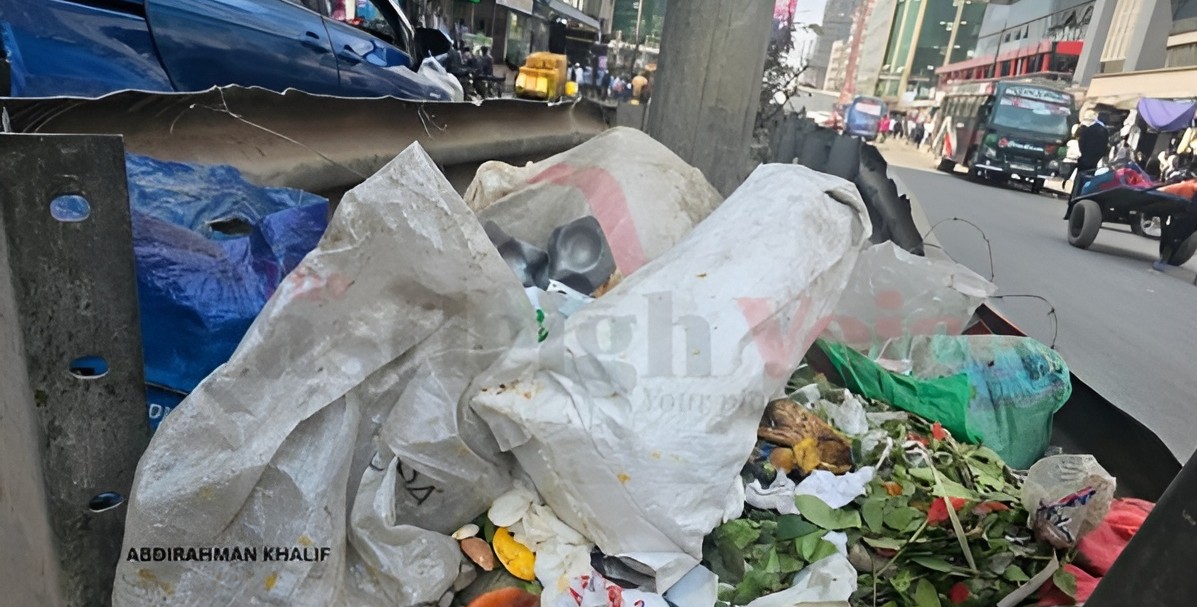Mosiria slams Eastleigh waste chaos as county failures fuel illegal dumping crisis

Mosiria said hawkers in Eastleigh have turned roads into open-air markets, blocking transport, dumping waste, and endangering lives.
When Nairobi City County Environment Chief Officer Geoffrey Mosiria visited Eastleigh recently, he delivered a stern warning on the state of garbage in the neighbourhood. He accused hawkers of illegally dumping waste on the streets and vowed action to prevent the area from descending into “chaos and impunity.”
Mosiria said hawkers in Eastleigh have turned roads into open-air markets, blocking transport, dumping waste, and endangering lives.
More To Read
- Governor Sakaja moves Geoffrey Mosiria from Environment to Customer Service docket
- Sakaja, MCAs agree on new housing policy and tenant reinstatement plan
- Geoffrey Mosiria faces sentencing over Parklands contempt case
- City Hall targets Eastleigh, Ruai, Kasarani in crackdown on illegal structures
- 12 matatu Saccos sue Nairobi County over eviction from three petrol stations
- Eastleigh’s Sgt. Kahande Street turns hazardous as stagnant water, traffic jams worry locals
"This lawlessness is unacceptable. Nairobi supports small-scale traders, but not at the expense of order, health, and safety. Drainages are blocked, garbage is everywhere, and public health is at risk. Let it be clear that order will be restored, and those who persist in illegality will face firm enforcement. Nairobi is a city of order and progress, not chaos and impunity," he said, days after making similar remarks at the end of a tour of the neighbourhood.
However, Mosiria did not acknowledge that much of the waste in Eastleigh does not originate solely from the shopping zones.
 Nairobi County Chief Officer for Environment, Geoffrey Mosiria. (Photo: Geoffrey Mosiria/Facebook)
Nairobi County Chief Officer for Environment, Geoffrey Mosiria. (Photo: Geoffrey Mosiria/Facebook)
Poor disposal practices
A recent University of Nairobi study on solid waste disposal in Eastleigh South Ward revealed that while new rental apartments have introduced garbage collection systems, poor disposal practices remain widespread.
According to the study, 48 per cent of residents said they discard waste along roads or in drainage channels, while 35 per cent said they use dustbins whose contents often end up in undesignated dumping sites.
Additional waste comes from hoteliers and even from outside Eastleigh, with several reported cases of garbage being dumped in the area from other parts of Nairobi.
Why then does the problem persist despite the sources being clear?
Illegal dumping
The study cites irregular waste collection, rampant illegal dumping, limited awareness of proper disposal, residents’ indifference, poor management by Nairobi County, reluctance to pay private collectors, and the high cost of private disposal services.
Rapid population growth has made the problem worse. Rising urban populations have pushed solid waste generation to levels that existing disposal systems—already haphazard and inefficient—cannot handle.
As a result, between 30 and 40 per cent of waste in urban areas goes uncollected, with Nairobi’s daily waste generation exceeding one kilogram per person.
"Moreover, urban management bodies have failed to implement solid waste management systems that are sustainable, resulting in enhanced illegal dumping in open fields that pose unfavourable effects on the environment, hence negatively impacting public health systems," the study notes.
 Youth from Backyard Self-Help Group in Eastleigh sorting food waste. (Photo: File/Ahmed Shafat)
Youth from Backyard Self-Help Group in Eastleigh sorting food waste. (Photo: File/Ahmed Shafat)
Daily solid waste
By 2019, Nairobi had a population of about 4.3 million, producing 2,400 tonnes of solid waste daily, according to the Kenya National Bureau of Statistics. Yet effective systems to manage this waste remain lacking, with harmful effects on health and the environment.
Because waste management is a devolved function, county governments are responsible for developing plans, especially in densely populated areas such as Eastleigh.
The study focused on Eastleigh due to its large population of residents, business people, employees and visitors, all of whom generate substantial amounts of waste. It found that 51.5 per cent of the waste is organic, while 48.5 per cent is inorganic, mainly packaging material.
"A variety of containers used for wrapping most items for sale are dumped in the environment. This has led to the development of many illegal dumpsites, which create an unhealthy environment and blockage of sewerage systems, resulting in flooding, especially during the rainy season. As a result, a substantial amount of the waste within the designated collection sites remained uncollected, which accumulates into filthy, huge moulds that negatively impact the quality of air in the surrounding neighbourhoods," the report states.
Unsorted garbage
The study also flagged the dumping of unsorted garbage in undesignated areas, leaving heaps of rotting waste uncollected.
Many residents avoid designated bins, opting instead to dispose of rubbish in drainage channels or the few available waste buckets.
"However, the study observed that though some respondents stored their waste in plastic buckets, plastic bags, and metallic bins, most of this waste was disposed of at the undesignated dumping sites."
Only 31.8 per cent of respondents had enlisted solid waste services. The majority take their trash to designated collection points, where county trucks collect waste only once or twice a week. In some areas, no collection occurs at all, forcing residents to burn heaps of garbage, further harming air quality.
Unmanaged solid waste
The UN-Habitat warns that no city with unmanaged solid waste can be sustainable.
"Findings conclude that a lack of concern by residents on good management practices of solid waste has led to negative impacts on solid waste disposal, damaging the environment. Further Findings indicate that some residents decry the services rendered by private collectors as unsatisfactory owing to delays and irregular collection, hence the unwillingness to pay, leaving them with no choice but to use unorthodox means of disposing of waste," the study adds.
It recommends that Nairobi County institutionalise waste management by investing in infrastructure and efficiency, including skips, trucks, bins, and clear guidelines for service providers.
Shared responsibility
In 2015, the county gazetted its Solid Waste Management Act, which makes waste management a shared responsibility between the county government, generators, property owners and occupiers, and contracted service providers.
The Act criminalises dumping waste anywhere other than in designated containers. However, its regulations were never operationalised.
In November last year, the county assembly directed the CEC for the environment to enforce Section 22 of the Act, which requires every premises to provide proper waste containers and ensure domestic waste is placed in them only.
The assembly also demanded regulations under Section 27, which allows revocation of licences for vehicles used in waste transport if they are not authorised.
Top Stories Today













































